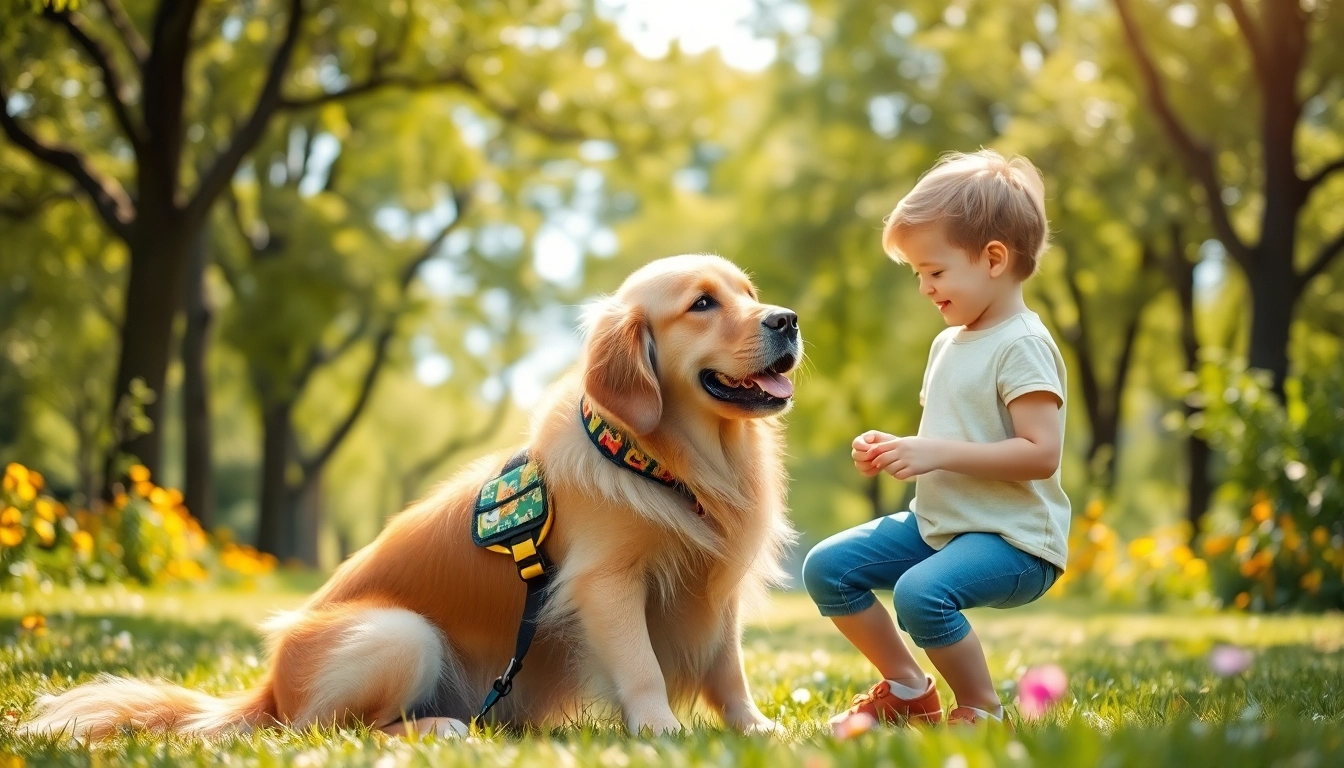Understanding Autism Service Dogs
Definition and Purpose of Autism Service Dogs
Autism service dogs are specially trained canines that provide assistance and support to individuals on the autism spectrum, particularly children. These dogs are trained to perform specific tasks that can help mitigate the challenges faced by autistic individuals, ranging from social interaction issues to sensory overload. Their companionship not only offers emotional support but also aids in improving the safety and independence of their handlers.
How Autism Service Dogs Improve Quality of Life
The presence of an autism service dog can significantly enhance the quality of life for both the child and their family. For children, these dogs can reduce anxiety during social situations, help manage sensory overload, and provide a sense of security. They can be trained to perform important tasks, such as alerting parents if a child wanders too far, helping to ground them during moments of distress, or even assisting with daily transitions like getting ready for school. Moreover, dogs encourage physical activity and can pave the way for social interaction, as they often attract attention and become conversation starters for children in social settings.
Legal Rights and Accessibility for Service Dogs
In many regions, autism service dogs are recognized under the Americans with Disabilities Act (ADA) as service animals. This means that they have specific legal protections and rights to accompany their handlers in public spaces where pets are usually not allowed. Understanding these rights is crucial for families seeking support and integration into various environments, from schools to public transportation. It’s important to also note that service dogs must be trained to perform tasks directly related to the person’s disability; emotional support alone does not qualify a dog as a service animal under the ADA.
Types of Autism Service Dogs Available for Sale
Different Breeds and Their Suitability
When considering autism service dogs for sale, it is essential to look at various breeds, as each breed comes with distinct traits that may or may not align with the needs of an autistic child. Common breeds include Labrador Retrievers, Golden Retrievers, and Standard Poodles, known for their gentle temperament and trainability. Breeds like Bernese Mountain Dogs and Boxers may also be suitable; however, it is crucial to evaluate an individual dog’s personality and temperament, rather than relying solely on breed characteristics.
Trained vs. Untrained Autism Service Dogs for Sale
Families must also decide whether to invest in a fully trained autism service dog or an untrained one that may require further training. Fully trained dogs can start performing their tasks immediately, providing instant support. On the other hand, an untrained dog can be a more affordable option, allowing families to customize training according to their specific needs. However, this route requires a commitment to the dog’s training and socialization process, which can take several months or even years. Understanding these options is critical to making an educated choice that meets the family’s needs and capabilities.
Cost Considerations for Purchasing a Service Dog
The cost of autism service dogs can vary widely based on their level of training, breed, and the organization providing them. On average, families might expect to pay anywhere from $15,000 to $30,000 for a fully trained autism service dog. Factors such as initial training, ongoing support, and health care can contribute to these costs. Some organizations offer financial aid or scholarships to families in need, so exploring all available options can help in budgeting effectively for this essential support.
What to Look for in an Autism Service Dog
Matching the Dog’s Temperament to Your Child’s Needs
Finding the right autism service dog involves assessing not just the dog’s training, but also its temperament in relation to your child’s individual needs. A good autism service dog should be calm, patient, and affectionate, capable of adapting to the child’s unique sensory and emotional requirements. Meeting potential service dogs before making a selection can help determine which dog is best suited for your child’s personality and challenges.
Evaluating the Dog’s Training and Background
When considering a service dog, it’s imperative to evaluate the training and background of the dog. Where the dog was trained, the methods used, and the experiences they’ve had can all influence their behavior and effectiveness as a service animal. For families, requesting documentation of training and any performance assessments can provide assurance regarding the dog’s capabilities and readiness to serve.
Assessing Compatibility with Your Family
Beyond training and temperament, it’s crucial to consider how well the dog integrates with your family as a whole. Observing how the dog interacts with family members ensures that the dog fits into your household’s dynamics. This includes interactions with any other pets, siblings, or extended family members, as well as how the dog behaves in different environments, from home to school visits or community outings.
The Benefits of Having an Autism Service Dog
Enhancing Social Interaction and Communication Skills
One of the most notable benefits of having an autism service dog is the enhancement of social interaction and communication skills for the child. The presence of a dog can serve as a social bridge, making it easier for children on the spectrum to connect with peers. Interactions that might otherwise be overwhelming can become more comfortable when facilitated by the calming presence of a dog, leading to increased participation in social activities and improved relationship-building skills.
Providing Safety and Independence for Children
Autism service dogs play an essential role in providing safety and promoting independence for children on the spectrum. These dogs can be trained to perform specific tasks that ensure safety, such as alerting parents when a child wanders off or creating a buffer zone in crowded places to reduce anxiety. This helps not only in protecting the child but also in fostering a sense of independence as they learn to navigate the world with their canine companion.
Improving Emotional Support and Stability
Emotional stability is a significant factor in the lives of individuals with autism, and service dogs can help provide this in numerous ways. The unconditional love and loyalty of a service dog can greatly enhance emotional support, acting as a comforting presence during difficult moments, or when sensory overload occurs. By providing companionship, service dogs can reduce feelings of loneliness and isolation, contributing positively to their owner’s mental health.
Finding Reliable Sources for Autism Service Dogs for Sale
Reputable Breeders and Training Facilities
When searching for autism service dogs for sale, it is crucial to focus on reputable breeders and training facilities. Look for organizations that adhere to recognized training standards and are transparent about their methods and experiences with dogs. Thorough research on the breeding and training backgrounds can significantly impact the success of the service dog in your specific situation.
Rescue Organizations and Adoption Opportunities
In addition to breeders, many families have found success through rescue organizations that specialize in finding homes for service dogs. Various non-profits and agencies focus on rehoming dogs that have already received some training. This avenue not only provides a cost-effective solution but also supports the important cause of animal rescue. Exploring these options can lead families to suitable candidates who need a second chance at companionship.
Questions to Ask Before Purchase
Before making such a significant investment, potential buyers should prepare a list of questions to ask the breeders or treatment facilitators. Important inquiries might include the dog’s training background, health clearances, behavior assessments, and the types of tasks the dog has been trained to perform. Additionally, asking about ongoing support after the sale, such as follow-up visits or training assistance, can help ensure that families feel supported long after bringing their service dog home.



